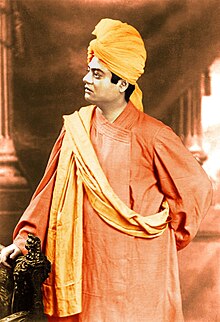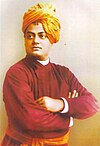John Henry Wright
John Henry Wright (February 4, 1852 – November 25, 1908)[1] was an American classical scholar born at Urumiah (Rezaieh), Persia.His father, Dr. Austin Hazen Wright (1811-1865) was a medical missionary (Dartmouth alumnus, 1830) in Persia from 1840 to 1865, with an interest in archaeology;[2][5][6] and an Oriental scholar.As there was a dearth of faculty to teach his specialization of classical archaeology and Greek history, he created courses on these subjects.[2] An Address on the Place of Original Research in Collegiate Education was a lecture which he delivered on 7 October 1886, at the opening of the eleventh academic year of Johns Hopkins College.Though Wright wrote it in 1892, it remained unpublished until Aristotle's work on the Constitution of the Athenians was discovered; this resulted in confirming his recording of the "Chronology of Events in Athens" of the seventh century.[1][2] In 1893, he wrote a paper named Herondaea, which contained valuable research works on the recently discovered papyrus of Herondas.In this book, he translated and published selections of most notable Greek literature including works of Homer, Tyrtaeus, Archilochus, Callistratus, Alcaeus, Sappho, Anacreon, Pindar, Aeschylus, Sophocles, Euripides, Aristophanes, Herodotus, Thucydides, Xenophon, Plato, Theocritus and Lucian.[10] In 1904, he read a paper "Present Problems of the History of the Classical Literature'" at the Congress of Arts and Sciences at the St. Louis Exposition.[1] In this article he deals with the antecedents of the allegory of the cave that the philosopher introduced in the opening of the seventh book of the Republic.Wright demonstrated that the attributes of the allegorical cave closely matched the actual one; he concluded they were likely based on it, with the possible influence of additional elements from the Empedocles' poem Purifications and the Quarry-Grottos of Syracuse.According to C. B. Gullick "His range in teaching was encyclopaedic, and a keen critical sense, fortified with wide reading, gave him what seemed like the power of divination in interpreting difficult texts".Wright and his contemporaries wrote memorable works which gained international attention for American classicists of this era.[14] Because of his contributions to Maxime Collignon's Manuel d'Archeologie Grecque and the classes he offered at Harvard, White was considered a pioneer in the US in the teaching of classical archaeology.



CambridgeMassachusettsDartmouth CollegeLeipzig UniversityCase Western Reserve UniversityauthorOhio State UniversityHarvard UniversityAmerican Philological AssociationAmerican Academy of Arts and SciencesMary Tappan WrightUrumiahPersiaJohns Hopkinsclassical philologyHarvardGraduate School of Arts and SciencesPlato's CaveAmerican Journal of ArchaeologySwami VivekanandaCambridge, MassachusettsLucy Myers Wright MitchellSanskritUniversity of LeipzigGeorg CurtiusFranz OverbeckAthensGreeceAmerican School of Classical Studies at AthensMaxime CollignonAristotleConstitution of the AthenianspapyrusHerondasTyrtaeusArchilochusCallistratusAlcaeusSapphoAnacreonPindarAeschylusSophoclesEuripidesAristophanesHerodotusThucydidesXenophonTheocritusLucianSt. Louis ExpositionA History of All Nations from the Earliest TimesFerdinand JustiSara Yorke StevensonMorris JastrowCave of VariMt. HymettusEmpedoclesArchaeological Institute of Americapresident of the American Philological AssociationGambierEli Todd TappanKenyon CollegeutopianAustin Tappan WrightJohn Kirtland WrightHanoverNew HampshireBaltimoreMarylandHenry Simmons FriezeBasil Lanneau GildersleeveWilliam Watson GoodwinWilliam Gardner HaleWilliam Sanders ScarboroughThomas Day Seymourclassical archaeologyParliament of the World's ReligionsChicagoBostonParliamentBrown Universitypublic domainGilman, D. C.New International EncyclopediaInternet ArchiveJames M. GarnettFrancis MarchBirthplacePrayer to Kali at DakshineswarBaranagar MathSwami Vivekananda's travels in India (1888–1893)RamakrishnaSarada DeviRelationship with Ramakrishnaat the Parliament of the World's Religions (1893)in CaliforniaTeachings and philosophyVivekananda and meditationInfluence and legacy of VivekanandaNeo-VedantaBibliographySangeet KalpataruBartaman BharatInspired TalksJnana YogaKarma YogaLectures from Colombo to AlmoraMy MasterRaja YogaThe East and the West"Kali the Mother"Khandana Bhava–BandhanaMy Play is DoneThe Hymn of SamadhiThe Song of the SannyasinTo the Fourth of JulyNachuk Tahate ShyamaBuddhism, the Fulfilment of HinduismChrist, the MessengerReligion not the crying need of IndiaArise, awake, and stop not till the goal is reachedAtmano mokshartham jagat hitaya chaBahujana sukhaya bahujana hitaya chaAdvaita AshramaBelur Math